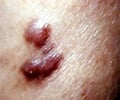Previously unknown properties of transmitted HIV-1, the virus that causes AIDS were identified by scientists from Los Alamos National Laboratory and University of Pennsylvania.

These findings will help inform vaccine design and interpretation of vaccine trials, and provide new insights into the basic biology of viral/host dynamics of infection.
During the course of each AIDS infection, the HIV-1 virus evolves within the infected person to escape the host's natural immune response and adapt to the local environment within the infected individual.
Because HIV evolves so rapidly and so extensively, each person acquires and harbors a complex, very diverse set of viruses that develops over the years of their infection. Yet when HIV is transmitted to a new person from their partner, typically only a single virus from the diverse set in the partner is transmitted to establish the new infection.
The key discoveries here are the specific features that distinguish those specific viruses which successfully move to the new host, compared with the myriad forms in the viral population present in a chronically infected individual.
"The viruses that make it through transmission barriers to infect a new person are particularly infectious and resilient," said Los Alamos National Laboratory scientist Bette Korber.
The team set out to determine whether the viruses that were successfully transmitted to a new patient might share distinct biological properties relative to those typically isolated from people with long-term, chronic infection.
They discovered several clear correlations. For example, transmitted viruses were both more infectious and contained more protective "envelope" per virus; envelope is the protein the virus uses to enter host cells.
The team identified an additional interesting property that could be a general characteristic of new viral infections: the transmitted HIV was capable of replicating and growing well in the presence of alpha interferon. Alpha interferon production is part of our innate human immune response to a new infection.
In the early days of an HIV infection, this innate immune response increases to an intense level, called a "cytokine storm," which gradually recedes during infection.
For a newly transmitted HIV to successfully establish infection, it must grow and expand in the new host while facing this cytokine storm. Although typical chronic viruses are sensitive to and inhibited by alpha interferon, transmitted HIV-1 viruses grew well in the presence of interferon.
The paper appeared is in this week's issue of Proceedings of the National Academy of Sciences.
Source-ANI
 MEDINDIA
MEDINDIA




 Email
Email









